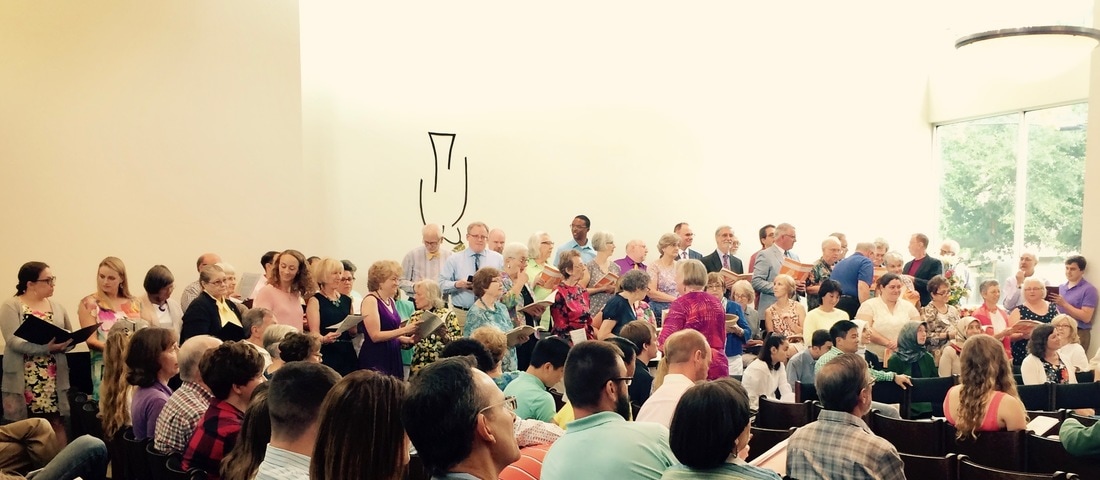Rev. Laura Mayo Covenant Church
When Henry Wadsworth Longfellow penned “Christmas Bells,” the poem that became the carol, “I Heard the Bells on Christmas Day,” in 1863, he was having a week not dissimilar to this one. The Civil War was raging and his son, despite Longfellow’s protests and pleading, had joined fight. The celebratory bells seemed discordant with the canon fire:
Then from each [hollow], accursed mouth
The cannon thundered in the South,
And with the sound
The carols drowned
Of peace on earth, good-will to all!
It was as if an earthquake rent
The hearth-stones of a continent,
And made forlorn
The households born
Of peace on earth, good-will to all!
The cannon thundered . . . The carols drowned Of peace on earth . . .
We know this - the silencing of peace on earth with bomb blasts.
We know this - perhaps especially this week - this holy week, we know the silencing of good will to all . . .
We are not strangers to defeat, bloodshed, death, chaos, destruction. Innocent citizens of Syria murdered by their government--as they have been for years now. Gathering clouds over the Korean peninsula. The mother of all bombs. As if there could be anything maternal about a bomb. Meanwhile, attempt after attempt to limit access to healthcare for women and less wealthy people for the purpose of enriching a few. Xenophobic rants about walls and bans. Senseless abandonment of regulations meant to prevent further devastation to our Earth.
They knew this that first holy week, too. The death of Jesus appeared to be the death of the campaign for the kingdom of God: the hoped for realm of peace and justice. A people's movement slaughtered with its leader. The votes were cast and it was Barabbas by a landslide - so many shouts of “Give us Barabbas” that they didn't even need to count the ballots. The occupying powers killed Jesus on a Roman cross. The empire won.
Barabbas, a known criminal, a violent man--he won, he beat the smiling man, mostly gentle, welcoming outcasts, challenging authorities, telling story after story of extravagant love: of a lost sheep worth the search, of a pearl with the greatest cost, of a measure of flour expanded into more than enough dough, of a small seed growing into a large tree, of a son welcomed home by a loving father . . . The stories are silenced. Pilate won. Herod won. Herod, that killer of the innocent. Rachel weeping in Ramah refusing to be comforted - Rachel is weeping again. She wept for her people taken captive/exiled, she wept when Jesus was a baby and all those baby boys were slaughtered, and now she weeps again: refusing comfort when all seems lost. Mary’s tears mingle with hers. Mary’s song of justice, sung when she learned of her pregnancy, turns to wails of anguished grief.
And so we go with the women to the tomb.
We go diminished, less than we were.
We go, the silence of death ringing in our ears.
We go expecting to find yet more death.
But as we get closer to the tomb, inching ever nearer to the decay we expect to find, worrying about how to roll away the stone, as we creep closer, closer, we see . . . what is that? We run now, fast, faster, at last here is the tomb and the stone is already gone.
And there! Sitting on the stone - the stone rolled away, the barrier removed, sitting there is an angel whose appearance is like lightning. The soldiers who were posted to stand guard are shaking and falling over like dead men. The angel shouts above the noise of the shaking earth, our shouts of shock and question: “Do not be afraid; I know that you are looking for Jesus who was crucified. He is not here; for he has been raised . . . Come, see the place where he lay. Then go quickly and tell his disciples, “He has been raised from the dead, and indeed he is going ahead of you to Galilee; there you will see him.” This is my message for you.”
“He is not here.” “He has been raised.” “He is going ahead of you and you will see him.” “This is my message.”
This is the message. The bells signal a message, a message of life. A message of yes. Easter is God’s yes to Jesus’ passion - passion for a realm of welcome, of justice, of peace.
Roger Cowan wrote:
And so we come on our donkeys,
Some from Detroit and some from Tokyo
and even a few from Seoul.
With horns blaring and brakes screeching,
We enter the city, the holy of holies.
We know what Caesar wants:
Testing ranges and new arenas
while the homeless haunt church basements
and the poor shuffle in the streets.
But we march to a different drummer.
Not many rich, not many mighty.
A vagabond crew in a strange land,
Whose ways are not our ways
Nor thoughts our thoughts.
But let us be of good cheer.
Let the word go out.
The donkey is mightier than the missile.
And flowers have been known to split a rock. . .
It is Caesar’s week.
But it is God’s world.
And so we take heart and rejoice.
Caesar, and his Judean governor Pilate, ruled by fear, grasped at power, they put Jesus to death because he was too big a threat, too unsettling a messenger, too disruptive to the empire. His welcome was too large, his embrace too wide. We left Friday in mourning - the culmination of Caesar’s week. We gather today - amid shouts of Hallelujah knowing it is God’s world.
“We know what Caesar wants/Testing ranges and new arenas while the homeless haunt church basements and the poor shuffle in the streets.” Caesar - corrupt power, systemic racism, oppression, the impulse toward violence, toward the narrowing of borders, the pushing out and making “other.” It has been Caesar’s week. It is always, in some form or another, Caesar’s week.
And that’s not the end of the story. Thank God, that’s not the end of the story. Yes, hate is strong but listen . . . listen to the bells: God is not dead nor doth God sleep. Easter shouts what no bomb blast can silence: This is God’s world.
Easter shows us that passion is not bound by death – passion to set the oppressed free, to feed the hungry and clothe the poor – passion for a realm of justice and peace does not end with death. Perhaps it is snuffed for a moment: defeated by a vote, a bomb, a bill . . . but it will rise! Passion can be renewed in the morning. The pain of defeat cannot drown out love. War cannot stifle peace.
“He is not here.”
“He has been raised.”
“He is going ahead of you and you will see him.”
“This is my message.”
This is the message, a new message, a message of life. A message of vindication. Easter is God’s yes to Jesus’ passion just as surely as it is God’s no to the oppressive powers of domination systems. Easter is God’s yes to Jesus’ passion - passion for a realm of welcome, of justice, of peace. . it may be Caesar’s week. It is God’s world.
“He is going ahead of you and you will see him.”
“I will be with you.” Jesus tells his followers as he commissions them to “go into all the world”:
“And lo, I am with you always, even to the close of the age.”
Right there with us when Caesar wins, with us when our efforts for justice and peace seem for naught - Jesus is right there with us, waving a palm branch as we carry our signs, turning over tables as we stand up for justice - and Jesus is with us when oppression and violence win the day. With us with the promise of resurrection.
Easter tells us, shows us, sings to us, flowers within us . . . that Jesus is with us in our passion for peace, in our hope for change, in our work to love each other. We need Easter. We need it to know as Cornel West writes “the something that sustains us [that] no empire can give and no empire can take away.”
Easter is God’s vindication of Jesus. It is the triumphant declaration that Jesus is Lord. This is a statement not only of faith but of politics. It has never meant more to me than it does now. Jesus is Lord, not Caesar. . . Jesus’s realm, his kingdom of equals, that’s where my loyalty lies. The rulers of this world cannot keep me from living, loving, and working in the realm of God where I look to Jesus as my guide.
Jesus is Lord, guide, leader, companion in the creation of the realm of God’s love. Jesus is with us. Look into each face and see the Christ beside you - urging you to take on passion for a world of justice - calling you with story after story of love abundant.
In so many churches Jesus hangs, literally or figuratively, silently on a cross. His voice silenced - crucified again and again such that he can never get a word out of his mouth. Jesus’ passion for the kingdom is silenced in the church’s obsession with his passionate suffering.
This is not what Easter demands of us.
We must let him off the cross! Caesar had his week.
We must let Jesus’ passion continue to inspire us, his vision of a kingdom on earth: the prophets dreamed of such a realm - a world of distributive justice, of sharing, of freedom, a world of peace.
Easter affirms Jesus is Lord - the powers of this world are not. We are the living body of Christ. The task is ours now - the task of peace on earth good will to all.
Death is not the end. Death cannot destroy the passion for the realm of God if we are willing to live it. Ring the bells! God is not dead nor doth God sleep. Ring the bells for peace on earth. Ring the bells for a realm of justice and welcome.
Ring the bells!
Hallelujah!
Amen
Copyright (c) 2017, Covenant Church

 RSS Feed
RSS Feed
